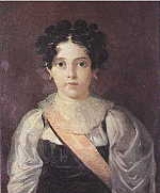
Infanta Ana de Jesus Maria, Duchess of Loulé
Encyclopedia

English language
English is a West Germanic language that arose in the Anglo-Saxon kingdoms of England and spread into what was to become south-east Scotland under the influence of the Anglian medieval kingdom of Northumbria...
: full name: Ana de Jesus Maria Luís Gonzaga Joaquina Micaela Rafaela Francisca Xavier de Paula de Bragança e Bourbon; Mafra, October 23, 1806 – Rome
Rome
Rome is the capital of Italy and the country's largest and most populated city and comune, with over 2.7 million residents in . The city is located in the central-western portion of the Italian Peninsula, on the Tiber River within the Lazio region of Italy.Rome's history spans two and a half...
, June 22, 1857) was a Portuguese
Portuguese people
The Portuguese are a nation and ethnic group native to the country of Portugal, in the west of the Iberian peninsula of south-west Europe. Their language is Portuguese, and Roman Catholicism is the predominant religion....
infanta and youngest daughter of King John VI of Portugal
John VI of Portugal
John VI John VI John VI (full name: João Maria José Francisco Xavier de Paula Luís António Domingos Rafael; (13 May 1767 – 10 March 1826) was King of the United Kingdom of Portugal, Brazil and the Algarves (later changed to just King of Portugal and the Algarves, after Brazil was recognized...
and his wife Carlota Joaquina of Borbón.
On December 5, 1827, she married Dom Nuno José Severo de Mendonça Rolim de Moura Barreto, then Marquis of Loulé
Marquis of Loulé
Marquess of Loulé is a Portuguese title granted by royal decree of Queen Maria I of Portugal, dated from July 6, 1799, to Dom Agostinho Domingos José de Mendoça Rolim de Moura Barreto , who already was 8th Count of Vale de Reis.This title was later inherited by his son, Nuno José Severo de Mendoça...
and Count
Count
A count or countess is an aristocratic nobleman in European countries. The word count came into English from the French comte, itself from Latin comes—in its accusative comitem—meaning "companion", and later "companion of the emperor, delegate of the emperor". The adjective form of the word is...
de Vale de Reis, future Duke of Loulé
Duke of Loulé
Duke of Loulé is a Portuguese title that was originally granted to the family of Moura Barreto.The dukedom was created by a royal decree of King Luis I of Portugal, dated from October 3, 1862, to his grand-uncle Nuno José Severo de Mendoça Rolim de Moura Barreto, 2nd Marquis of Loulé and 9th Count...
. Subsequently, he served several times as prime minister of Portugal). The wedding was celebrated in a private ceremony in the chapel of the Royal Ajuda Palace and was a scandal
Scandal
A scandal is a widely publicized allegation or set of allegations that damages the reputation of an institution, individual or creed...
at the time. Although Loulé was a nobleman
Nobility
Nobility is a social class which possesses more acknowledged privileges or eminence than members of most other classes in a society, membership therein typically being hereditary. The privileges associated with nobility may constitute substantial advantages over or relative to non-nobles, or may be...
and remote descendant of Portugal's royal dynasty
Dynasty
A dynasty is a sequence of rulers considered members of the same family. Historians traditionally consider many sovereign states' history within a framework of successive dynasties, e.g., China, Ancient Egypt and the Persian Empire...
, Dona
Don (honorific)
Don, from Latin dominus, is an honorific in Spanish , Portuguese , and Italian . The female equivalent is Doña , Dona , and Donna , abbreviated "Dª" or simply "D."-Usage:...
Ana de Jesus was the first infanta of Portugal since the Middle Ages
Middle Ages
The Middle Ages is a periodization of European history from the 5th century to the 15th century. The Middle Ages follows the fall of the Western Roman Empire in 476 and precedes the Early Modern Era. It is the middle period of a three-period division of Western history: Classic, Medieval and Modern...
to marry a man who was not of royal rank. The reasons for the marriage were probably not political, considering the couple's first child was born on December 27, 1827, twenty-two days after the ceremony. The marriage had not been approved by D. Ana's father, King John VI, prior to his death (strictly, Portuguese law at the time only stated that the marriage of the heiress presumptive
Heir Presumptive
An heir presumptive or heiress presumptive is the person provisionally scheduled to inherit a throne, peerage, or other hereditary honour, but whose position can be displaced by the birth of an heir or heiress apparent or of a new heir presumptive with a better claim to the position in question...
required the sovereign's consent, a position D. Ana never held). Nor were either of her brothers present in the country at the time of the wedding (both claimed the kingship from abroad). The designated regent
Regent
A regent, from the Latin regens "one who reigns", is a person selected to act as head of state because the ruler is a minor, not present, or debilitated. Currently there are only two ruling Regencies in the world, sovereign Liechtenstein and the Malaysian constitutive state of Terengganu...
of the kingdom was D. Ana's elder sister, Infanta Isabel Maria of Portugal
Infanta Isabel Maria of Portugal
Infanta Isabel Maria of Portugal Infanta Isabel Maria of Portugal Infanta Isabel Maria of Portugal (or of Braganza and Borbón; ; Queluz, July 4, 1801 – Benfica, then Belém, April 22, 1876 was a Portuguese infanta (princess) daughter of King John VI of Portugal and his wife Carlota Joaquina of...
, who was present in Lisbon. The marriage was not an elopement, as the royal family
Royal family
A royal family is the extended family of a king or queen regnant. The term imperial family appropriately describes the extended family of an emperor or empress, while the terms "ducal family", "grand ducal family" or "princely family" are more appropriate to describe the relatives of a reigning...
was aware of the couple's intention to marry and D. Ana's mother facilitated rather than sought to prevent the marriage before her daughter gave birth.
With the restoration of absolutism in Portugal in 1831 the couple was exile
Exile
Exile means to be away from one's home , while either being explicitly refused permission to return and/or being threatened with imprisonment or death upon return...
d and began extended travel through Europe. They had several other children abroad. The marriage ended with a de facto
De facto
De facto is a Latin expression that means "concerning fact." In law, it often means "in practice but not necessarily ordained by law" or "in practice or actuality, but not officially established." It is commonly used in contrast to de jure when referring to matters of law, governance, or...
separation in 1835. The infanta died before her husband was created a duke.
D. Ana's heir, and the head of the Loulé ducal line
Duke of Loulé
Duke of Loulé is a Portuguese title that was originally granted to the family of Moura Barreto.The dukedom was created by a royal decree of King Luis I of Portugal, dated from October 3, 1862, to his grand-uncle Nuno José Severo de Mendoça Rolim de Moura Barreto, 2nd Marquis of Loulé and 9th Count...
is her great-great-great-grandson D. Pedro Folque de Mendoça Rolim de Moura Barreto, 6th Duke of Loulé. He is considered by some to be the rightful pretender
Pretender
A pretender is one who claims entitlement to an unavailable position of honour or rank. Most often it refers to a former monarch, or descendant thereof, whose throne is occupied or claimed by a rival, or has been abolished....
to the defunct Portuguese throne by virtue of his ancestors' uninterrupted domicile
Domicile (law)
In law, domicile is the status or attribution of being a permanent resident in a particular jurisdiction. A person can remain domiciled in a jurisdiction even after they have left it, if they have maintained sufficient links with that jurisdiction or have not displayed an intention to leave...
on Portuguese soil
Jus soli
Jus soli , also known as birthright citizenship, is a right by which nationality or citizenship can be recognized to any individual born in the territory of the related state...
, although the duke makes no active claim to that legacy and accepted recognition of his ducal title from the Portuguese nobiliary
Nobility
Nobility is a social class which possesses more acknowledged privileges or eminence than members of most other classes in a society, membership therein typically being hereditary. The privileges associated with nobility may constitute substantial advantages over or relative to non-nobles, or may be...
institution headed by another pretender, Duarte Pio, Duke of Braganza
Duarte Pio, Duke of Braganza
Dom Duarte Pio, Duke of Braganza , is the 24th Duke of Braganza and a pretender to the throne of Portugal.-Birth and education:...
.
Nuno da Câmara Pereira, a famous fado
Fado
Fado is a music genre which can be traced to the 1820s in Portugal, but probably with much earlier origins. Fado historian and scholar, Rui Vieira Nery, states that "the only reliable information on the history of Fado was orally transmitted and goes back to the 1820s and 1830s at best...
singer, belongs to the Partido Popular Monárquico (PPM) in the Assembly of the Republic
Assembly of the Republic
The Assembly of the Republic is the Portuguese parliament. It is located in a historical building in Lisbon, referred to as Palácio de São Bento, the site of an old Benedictine monastery...
and descends from D. Ana. He promotes restoration of the monarchy under his branch of the Loulé family, despite the fact that his lineage from the infanta is both less senior
Agnatic seniority
Agnatic seniority is a patrilineal principle of inheritance where the order of succession to the throne prefers the monarch's younger brother over the monarch's own sons. A monarch's children succeed only after the males of the elder generation have all been exhausted...
than that of his cousin the duke, and is through an illegitimate
Legitimacy (law)
At common law, legitimacy is the status of a child who is born to parents who are legally married to one another; and of a child who is born shortly after the parents' divorce. In canon and in civil law, the offspring of putative marriages have been considered legitimate children...
line. PPM, however, has inclined toward the Duke of Loulé as its candidate for the throne.
Children:
- D. Ana Carlota de Mendoça Rolim de Moura Barreto
- D. Maria do Carmo de Mendoça Rolim de Moura Barreto
- D. Pedro José Agostinho de Mendoça Rolim de Moura Barreto, 2nd Duke of Loulé
- D. Maria Amália de Mendoça Rolim de Moura Barreto
- D. Augusto Pedro de Mendoça Rolim de Moura Barreto, 3rd Count of Azambuja

